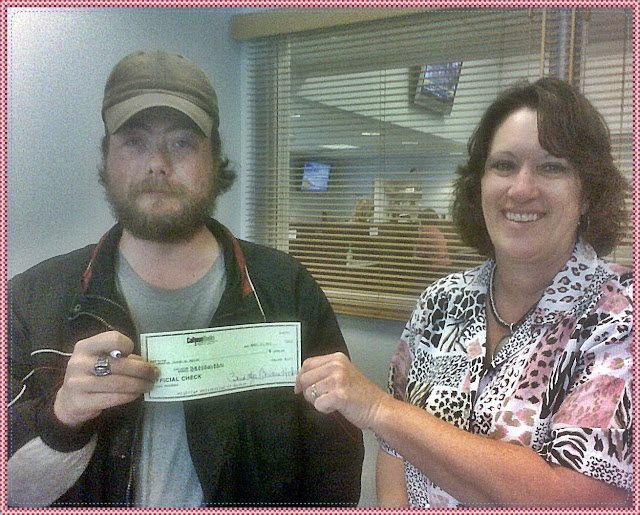Center for Social Capital
Launches Compensating Balance Loan Fund:
fighting poverty through employment
Jesse just received a $5,000 Compensating Balance Loan from Calhoun Bank of Gilmer Co., West Virginia. Branch Manager Brenda Wolfe presented Jesse with the loan check he will use to purchase resources in the form of equipment, enabling him to land a job at the Self-Suds Laundromat. This is quite a feat for a 26 year old man who has never had a job, lives in a rural community with high unemployment, has no transportation or credit history, and lives below the federal poverty level.
How did he do it? By taking advantage of an innovative strategy called Customized Employment (CE) and utilizing resource ownership with a Compensating Balance Loan. Half of all working-age adults experiencing income poverty have a disability. The rates of disability among those experiencing poverty are much higher than among the overall working-age population. Just under a quarter (23 percent) of all working-age adults have a disability.
Having resources and being resourceful is the key to employment . . . and employment is the key to escaping poverty. But trying to obtain resources without money is virtually impossible for many persons the world over living in poverty. And obtaining a bank loan without credit is equally impossible.
Jessica Jackley, who co-founded Kiva in the spring of 1984, was first inspired by working in East Africa with rural entrepreneurs.
Traditional funding sources can be expensive, difficult to access . . .
Kiva.org aims to alleviate the fight against global poverty by making it easy for members to transfer money to people in third world nations who aim to start their own businesses. Capitalism is one of the best ways to fight poverty, but many people in the developing world don’t have access to the necessary funds to pursue their goals.
We want to see a world in which all people are empowered to pursue their dreams . . .
Jessica Jackley and Kiva have likewise inspired the CENTER FOR SOCIAL CAPITAL and a growing number of anonymous donors to help persons escape poverty through employment. They have created a Business Capitalization Fund for the purpose of making available compensating balance loans.
A COMPENSATING BALANCE, sometimes called an offsetting balance, is an amount of money that a bank and borrower agree to keep in the borrower's bank account as a condition for the bank giving the borrower a loan. Banks around the world have used compensating balance loans for decades. Borrowers who haven’t been able to get a loan through other methods might have better success applying for a compensating balance loan.
In Jesse’s case, his loan is fully collateralized, meaning that the compensating balance on deposit is 100% of the value of the loan. So there is zero risk to the bank and the funds are available for the bank to use in generating additional capital. This eliminates the credit history requirements that would disqualify most loan applicants living in poverty. Plus, the cost of processing such loans in house is considerably lower than for conventional loans, resulting in lower interest rates for borrowers.
It is widely known that the more resources you possess (a car, tools, special talent or skills, relationships), the better the odds are you’ll get a job. After all, that’s why many people go to college or trade schools. Obtaining a degree or professional license is quite expensive, but in the long run may pay for itself many times over in a lifetime of earnings and quality of life. Persons who live in poverty with disability face a huge disadvantage.
It is widely known that the more resources you possess (a car, tools, special talent or skills, relationships), the better the odds are you’ll get a job. After all, that’s why many people go to college or trade schools. Obtaining a degree or professional license is quite expensive, but in the long run may pay for itself many times over in a lifetime of earnings and quality of life. Persons who live in poverty with disability face a huge disadvantage.
According to the U.S. Department of Labor’s Office of Disability Employment Policy (ODEP): “Customized Employment is a process through which the relationship between employer and employee is negotiated and personalized in a way that meets the needs of both. The negotiation process addresses areas such as job duties, terms of employment, services and supports necessary to carry out the job duties, and expectations adapted to the needs or special circumstances of one particular job seeker.”
“With Job Squad’s help,” says Jesse, “our negotiations led to how, using my own equipment and the job skills I already possessed as resources, could make it possible for the business owner to create a job that did not previously exist. It would be customized to my unique abilities and limitations. In exchange, all my resources would ‘help them meet specific production or sales goals, increase customer satisfaction, improve operations . . . ‘ I will use my equipment to fill customer orders for bar rags, sell gourmet beverages, and keep the equipment clean for laundromat customer use.”
The best part is that everyone wins . . .
Jesse gets a job at pay above minimum wage, added job security, and starts building a credit history.
The employer gets increased revenues from the added value Jesse and his resources bring to the business.
The Bank increases its revenues due to added capital from the compensating balance on deposit, and a potential future customer with a favorable credit history and relationship with the bank.
The fund donors experience the satisfaction Jessica Jackley so eloquently expressed, by helping people escape the crushing grip of poverty.


